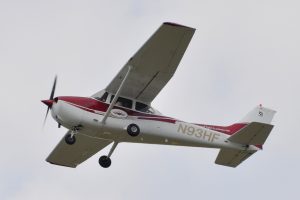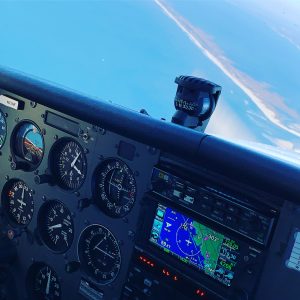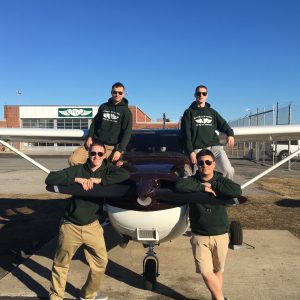Flight cancellations, delays, crowded airports. Sound familiar? If you’ve traveled by air recently, you more than likely have experienced some of these disruptions. With the ongoing national pilot shortage fueling part of what we may call “travel chaos,” airlines are taking control by initiating their own pilot training programs. And just last month, U.S. Senate representatives got on board in response to the pilot shortfall. So, will the problem get worse before it gets better? Buckle up as Vaughn College takes a closer look at how the industry is responding to this demand and explains how its programs and partnerships are the perfect combination to educate and train the next generation of pilots.
An unprecedented demand for pilots
According to the U.S. Bureau of Labor Statistics, about 14,500 pilot openings are projected each year over the next decade. This unprecedented demand stems in part from the early retirement of pilots during the pandemic, a reduced number of trained military pilots and the high cost of aviation training. To fill this gap in the pilot pipeline, Republic Airways and United Airlines, among other well-known companies, have initiated their own pilot training programs to meet the demand. Let’s take a look at how they operate.
How the industry is responding to the shortfall
Republic Airways
Republic Airways—a regional airline that services Delta Connection and United Express, among others—is on a mission to train pilots, fast. The goal is to teach pilots in a shorter period of time through intense training that is mission-specific to flying commercial airplanes. Republic Airways believes its pilot training program is so good, that it rivals the military by using more technology and better simulation. Instead of the 1,500 flight hours that is required for commercial pilots, Republic Airways filed a request with the Federal Aviation Administration (FAA) requesting that its pilots be allowed to fly with only 750 flight hours. And, to sweeten the deal, Republic Airways is offering deep discounts and jobs to students who finish this program.
United Airlines
At United Airlines’ training facility in Denver, Colorado, former Blue Angel and Top Gun pilots are training regional and military pilots on how to fly commercial airliners safely and professionally. Pilots who are new to United Airlines spend five weeks training in a simulator, where they learn the intricacies about the specific planes they will be flying. The program is proving successful, having turned out a record of 40-to-70 new hires a week.
U.S Senator’s Legislation Addresses Pilot Shortage
On July 25, 2022, Senator Lindsey Graham (R-South Carolina) and five other U.S. senators introduced the Let Experienced Pilots Fly Act (S.4607) to address the massive amount of flight cancellations that has been caused by the ongoing pilot shortage. This legislation will raise the mandatory commercial pilot retirement age from 65 to 67, in addition to:
- Requiring that pilots over the age of 65 maintain a first-class medical certification, which must be renewed every six months.
- Requiring air carriers to continue using pilot training and qualification programs approved by the FAA.
- Not changing or altering any other qualification—beyond age—to become a commercial airline pilot.
How Vaughn can help you earn your wings
With 90 years of aviation history under our belts (and yes, they are fastened!) Vaughn students have gone on to pursue amazing careers in the field of aviation as well as engineering and technology and management. And when it comes to our reputation, Vaughn’s aircraft operations (flight) program is one of only 29 institutions that are currently part of the FAA’s Air Traffic Collegiate Training Initiative (AT-CTI.) Vaughn students train on the same equipment used by the FAA, which helps accelerate their training upon acceptance to the FAA Academy in Oklahoma City, Oklahoma. And were you aware that Vaughn has partnerships in the industry which in turn give students a competitive edge when preparing for their careers? Check these out!
Atlas Air
Vaughn’s long-term relationship with Atlas Air has proven to be truly valuable, as several Vaughn graduates have landed full-time positions in virtually every department with this renowned American cargo airline, passenger charter airline and aircraft lessor based in Purchase, New York. Just recently, Atlas Air and Vaughn faculty collaborated to develop the “Pathway to Success First Officer Trainee Program.” This exciting pilot pathway program is designed to enable new pilots at the RATP level—upon successful completion of a comprehensive training program—to transfer directly to Atlas Air’s 737 air fleet. This is big news, as the program allows new pilots to forgo the traditional pathway through regional airlines and go straight into a career flying Boeing aircraft. And even more enticing is that this program includes a monthly stipend, medical benefits, a 401(k), transportation and accommodations.
Jet Blue Airways “University Gateway” Pilot Pathway Program
Last year, Vaughn College announced its partnership with JetBlue Airways as part of the airline’s ‘University Gateway’ Pilot Pathway Program. This is the airline’s longest-running pathway program that allows flight students who attend Aviation Accreditation Board International (AABI)-accredited institutions—such as Vaughn—to apply and interview for positions at JetBlue while completing their collegiate courses. Once accepted, students will follow a defined path to gain experience and build their flight time before joining JetBlue as first officers upon completion of the program.
Heritage Flight Academy
Vaughn’s contract with Heritage Flight Academy gives Vaughn aircraft operations (flight) students the opportunity to put their knowledge into action—at the controls and in the air—by giving them direct access to the latest technology, equipment and skilled flight instructors. Since 2013, Heritage Flight Academy—located at MacArthur Airport on Long Island—has trained hundreds of Vaughn aircraft operations students as part of its Federal Aviation Administration (FAA)-approved Part 141 training operation. Check out our blog to learn more about this partnership and how it benefits students: “Vaughn’s Long-standing Partnership with Heritage Flight Academy Gives Pilot Students an Edge.”
The future you
Today’s college students are zeroing in on more career-focused majors that will land them get jobs before the ink dries on their diplomas. Airlines need pilots—and that need will remain for many years to come. Could you be next? If becoming a pilot was ever on your radar, now is the time to act.
Have you ever thought about becoming a pilot? There’s never been a better time—or place—to earn your wings. Vaughn College has an exclusive partnership with Heritage Flight Academy which gives Vaughn aircraft operations students a place to practice flying as they work to achieve their flight certificates and ratings in addition to earning their bachelor’s degree.
We had the privilege of speaking to Neil Visse, executive vice president of Heritage Flight Academy, to discuss how the College’s exclusive long-standing relationship with Heritage has been instrumental in paving the way for hundreds of Vaughn students each year to get their flight certificates and achieve their dreams of becoming pilots.
Why now is the best time to become a pilot
The ongoing pilot shortage is more prevalent than ever before. After the lockdowns due to the pandemic, travelers are taking to the skies sooner than expected, leaving airlines trailing behind the demand. “There’s never been a better time to become a pilot,” said Visse. “The aviation industry went through a dry spell when the COVID-19 pandemic began. Between pilots taking early retirement and those who were furloughed during that time, the industry is seeing a pilot shortage even greater than before.”
Pathway to becoming a pilot
 Becoming a pilot is an exciting venture. Students not only learn the academics of flight operations through programs like the aircraft operations degree at Vaughn, but they get to put that knowledge into action—at the controls and in the air—at flight schools such as Heritage Flight Academy. Since 2013, Heritage Flight Academy, located at MacArthur Airport on Long Island, has trained hundreds of Vaughn aircraft operations students as part of its Federal Aviation Administration (FAA)-approved Part 141 training operation. “We have seen substantial growth over the years,” Visse said. “We have invested not only in our state-of-the-art aircraft but increased our professional staff and operating space. Currently, we have between 100-120 Vaughn students enrolled in our program at any given time.”
Becoming a pilot is an exciting venture. Students not only learn the academics of flight operations through programs like the aircraft operations degree at Vaughn, but they get to put that knowledge into action—at the controls and in the air—at flight schools such as Heritage Flight Academy. Since 2013, Heritage Flight Academy, located at MacArthur Airport on Long Island, has trained hundreds of Vaughn aircraft operations students as part of its Federal Aviation Administration (FAA)-approved Part 141 training operation. “We have seen substantial growth over the years,” Visse said. “We have invested not only in our state-of-the-art aircraft but increased our professional staff and operating space. Currently, we have between 100-120 Vaughn students enrolled in our program at any given time.”
The process to make it happen
Students enrolled in the four-year aircraft operations (flight) degree program at Vaughn can begin their training at Heritage in their freshmen year. Visse walked us through the process of how students can begin earning their certificates and ratings:
Freshman year—Achieving a private pilot license
Required flight time: 35 hours, which includes time with flight instructor and solo flight time.
Students will take their first private pilot course (two semesters) at Vaughn simultaneously with the flight-training course at Heritage. This allows students the benefit of demonstrating their academic knowledge as they apply it to their flight lessons. Students can expect to complete their private pilot license certificate by the end of their freshmen year.
Sophomore year—Instrument rating/commercial rating
Required flight time for instrument rating: 35 dual hours with instructor, including flight simulator time.
Instrument rating—During the first semester of sophomore year, students will work toward earning their instrument rating, which permits them to take off, fly and land using the instruments in their aircraft—under Instrument Flight Rules (IFR). Students who pass their instrument rating tests will then earn a private pilot’s license with instrument rating.
Required flight time for commercial rating: 120 total hours (65 hours of dual flight time and 55 hours of solo flight time).
Commercial rating—During the second semester of sophomore year, students can work toward earning their commercial pilot rating. This rating requires the most hours and allows them to fly for hire. The flight-training program at Heritage includes ratings for both single and multi-engine aircraft at the commercial level.
Junior year—Certified flight instructor airplane and certified flight instructor instrument ratings
 Required flight time: 35 hours.
Required flight time: 35 hours.
During their junior year, students will work toward earning the next two licenses with the objective that during their senior year they build up flight time by serving as flight instructors, where they will teach skills to new students interested in earning their flight ratings. According to Visse, the goal is for students to complete all their flight training by the end of their junior year—including their flight instructor airplane and instrument ratings.
With all of these ratings under their belts, students can complete their degrees and be well positioned to enter the workforce. “Students will not have any problem finding a job as a pilot today,” Visse said.
There are certain things to keep in mind when considering whether or not to become a pilot, including the additional cost and time it takes to earn required certificates and ratings. Visse suggests that students speak with a financial aid counselor to discuss their opportunities for financial assistance as well attending a Vaughn open house or information session to talk to student pilots about their experiences. Students can also schedule a virtual meeting with an admissions counselor to discuss their questions and next steps.
The Vaughn/Heritage advantage
There’s no denying that becoming a pilot can be time intensive—not to mention expensive. Visse explains how Heritage shares Vaughn’s passion of seeing students succeed. That’s why this is the only flight school to offer ‘flexible scheduling’ which is a huge advantage for students with busy schedules. Heritage will work around work or class schedules so students can train whenever it’s convenient for them – schedules can change weekly. Additionally, Heritage offers a flat-rate program for Vaughn students when purchasing flight hours, which means after students pay for a certain number of hours, they earn free hours – this makes it much more affordable. “The resilience of our students throughout the pandemic has been amazing,” Visse said proudly. “We are proud to offer unique programs designed to not only help our students succeed but relieve some of their stress at the same time.”
A rewarding partnership
 For the past 15 years, Visse has been an integral part of the aviation industry. While he has enjoyed flying as a pilot, over the years his path has “detoured” to the operational side of the business. “There’s never been a time that I didn’t think about flying,” he said. “My dad was a pilot. I guess you can say it’s in my blood.” Visse said Heritage has seen its fair share of changes over the years. “Thanks to our incredible partnership with Vaughn College, Heritage Flight Academy is now the largest operator at MacArthur Airport,” he said. “Watching our students move on with their careers is bittersweet, but we are proud knowing that we—along with Vaughn—were instrumental in making their dreams of becoming a pilot a reality.”
For the past 15 years, Visse has been an integral part of the aviation industry. While he has enjoyed flying as a pilot, over the years his path has “detoured” to the operational side of the business. “There’s never been a time that I didn’t think about flying,” he said. “My dad was a pilot. I guess you can say it’s in my blood.” Visse said Heritage has seen its fair share of changes over the years. “Thanks to our incredible partnership with Vaughn College, Heritage Flight Academy is now the largest operator at MacArthur Airport,” he said. “Watching our students move on with their careers is bittersweet, but we are proud knowing that we—along with Vaughn—were instrumental in making their dreams of becoming a pilot a reality.”
 Becoming a pilot is an exciting venture. Students not only learn the academics of flight operations through programs like the
Becoming a pilot is an exciting venture. Students not only learn the academics of flight operations through programs like the  Required flight time:
Required flight time: For the past 15 years, Visse has been an integral part of the aviation industry. While he has enjoyed flying as a pilot, over the years his path has “detoured” to the operational side of the business. “There’s never been a time that I didn’t think about flying,” he said. “My dad was a pilot. I guess you can say it’s in my blood.” Visse said Heritage has seen its fair share of changes over the years. “Thanks to our incredible partnership with Vaughn College, Heritage Flight Academy is now the largest operator at MacArthur Airport,” he said. “Watching our students move on with their careers is bittersweet, but we are proud knowing that we—along with Vaughn—were instrumental in making their dreams of becoming a pilot a reality.”
For the past 15 years, Visse has been an integral part of the aviation industry. While he has enjoyed flying as a pilot, over the years his path has “detoured” to the operational side of the business. “There’s never been a time that I didn’t think about flying,” he said. “My dad was a pilot. I guess you can say it’s in my blood.” Visse said Heritage has seen its fair share of changes over the years. “Thanks to our incredible partnership with Vaughn College, Heritage Flight Academy is now the largest operator at MacArthur Airport,” he said. “Watching our students move on with their careers is bittersweet, but we are proud knowing that we—along with Vaughn—were instrumental in making their dreams of becoming a pilot a reality.”